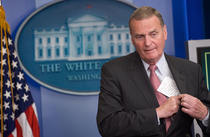 With Obama’s administration gradually filling up, problems appear to be brewing at the centre. Though picking ex-General James Jones as a National Security Adviser was seen as a smart move, associating the general’s wide experience and bi-partisan appeal with the young president, it may be turning out not to be so clever after all.
With Obama’s administration gradually filling up, problems appear to be brewing at the centre. Though picking ex-General James Jones as a National Security Adviser was seen as a smart move, associating the general’s wide experience and bi-partisan appeal with the young president, it may be turning out not to be so clever after all.
President Obama continues to rely on his campaign advisers, principally Denis McDonough, nominally one of Jones’ deputies, and Mark Lippert, the Chief of Staff of the National Security Council and a confidant of Vice-President Biden. Both aides have a close personal bond with the President. General Jones, in turn, is often out of the loop and even absent from key internal meetings, such as the crisis talks that followed North Korea’s nuclear tests.
Tensions have been particularly apparent in the battle to reorganise the NSC. General Jones apparently gave Lieutenant General Doug Lute, who was appointed as Bush war “czar”, a broad remit in the Obama NSC – without consulting the President or Vice-President, who were said to be keen to turf out the Bush holdover. Not wanting to face down Jones, who was beginning to take flack in the press about his limited role, Obama allowed Lute to stay. But subsequent NSC appointments, including that of Dennis Ross, have served to dilute Lute’s influence.
Now Jones is coming in for renewed criticism after reports have surfaced of him telling military commanders in Afghanistan not to ask for additional troops – as such a request would sit uncomfortably with the counsel already given to the president by his close advisers.
In the past, National Security Advisers have succeeded when they had the President’s complete confidence. Whatever else he brings to the job, this no longer seems to be the case for General Jones. Expect his tenure in the White House to be shorter than the President’s four-year mandate.






Comments